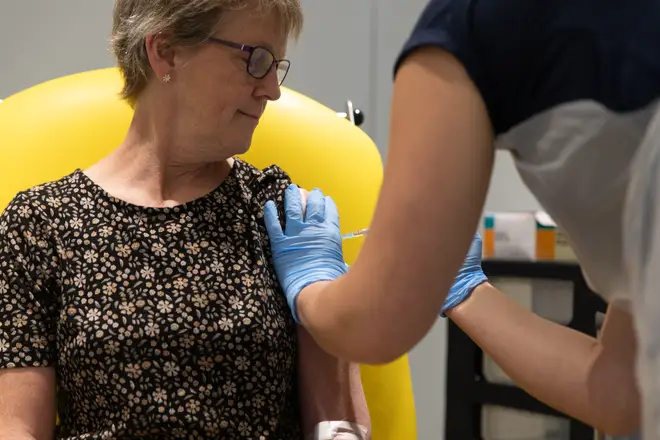
Oli Dugmore 4am - 7am
31 December 2020, 21:13

Delaying second doses of coronavirus vaccines is the "right decision" and will save lives, the UK's four chief medical officers (CMOs) have said.
In a joint statement, the CMOs for England, Scotland, Wales and Northern Ireland said pushing back people's follow-up jabs is "much more preferable" as the first dose offers "substantial" protection.
The publication said it is the correct decision to help tackle the Covid-19 pandemic "which is running rampant in our communities", in part due to the new strain of the virus.
Britain's four CMOs told others in the medical profession they believe the public "will understand and thank us for this decisive action" and said they "hope this has your support".
On Wednesday, a change in guidance suggested the administration of booster jabs should be extended to up to 12 weeks after the first dose.
It is hoped the decision will maximise the number of people receiving some protection from coronavirus, rather than fully protecting fewer people in that same period of time.
Read more: UK records highest ever daily total of coronavirus infections
Read more: Public warned to stay at home on NYE as cases reach all-time high

Intensive care doctor asks why he should carry on treating people if they don't wear masks
They said they were "confident" that the first dose of both the Oxford-AstraZeneca and the Pfizer-BioNTech vaccines would provide "substantial" protection from the virus for two to three weeks.
The alteration to the vaccination programme prompted a response from Pfizer - whose drug was the first to be authorised and dished out in the UK - with the firm issuing a warning about "alternative dosing".
"There are no data to demonstrate that protection after the first dose is sustained after 21 days," a spokesman for the pharmaceutical company said.
It comes as the Hospital Consultants and Specialists Association (HCSA) warned that the "ill-thought-out" plan to delay the second dose would leave vulnerable staff in limbo.
Read more: London hospital in 'disaster medicine mode' as cases keep rising
Read more: London council leaders urge Williamson to reverse school openings

Petrified teacher losing hair over having to return to classroom
General secretary Paul Donaldson said: "While a planned and orderly deployment of the Oxford vaccination including longer timelines makes epidemiological sense, the decision to throw a spanner in the works of the existing Pfizer rollout appears simply bizarre unless there is an unknown hitch in supply.
"We are hearing that vulnerable hospital doctors at high risk from Covid have been told not to turn up for their second dose and therefore will not receive full protection.
"They are now left in limbo by a hastily formulated policy which seems extremely ill-thought-out."
It comes on the day the UK recorded its highest ever daily figure for total cases, with another 55,892 infections being confirmed.
Meanwhile, a further 964 people died within 28 days of testing positive for Covid as of Thursday, bringing the country's death toll to 73,512.

Andrew Castle challenges Williamson over teachers' vaccination
In the statement, the four CMOs said: "We recognise that the request to reschedule second appointments is operationally very difficult, especially at short notice, and will distress patients who were looking forward to being fully immunised.
"However, we are all conscious that for every 1,000 people boosted with a second dose of Covid-19 vaccine in January (who will as a result gain marginally on protection from severe disease), 1,000 new people can't have substantial initial protection which is in most cases likely to raise them from 0% protected to at least 70% protected.
"Whilst the NHS, through all of your work, has so far vaccinated over one million UK patients with a first dose, approximately 30 million UK patients and health and social care workers eligible for vaccination in Phase 1 remain totally unprotected and many are distressed or anxious about the wait for their turn.
"These unvaccinated people are far more likely to end up severely ill, hospitalised on in some cases dying without vaccine.
"Halving the number vaccinated over the next two-three months because of giving two vaccines in quick succession rather than with a delay of 12 weeks does not provide optimal public health impact.
"We have to follow public health principles and act at speed if we are to beat this pandemic which is running rampant in our communities and we believe the public will understand and thank us for this decisive action. We hope this has your support."

SAGE member says schools should be closed for January
An NHS spokesperson said: "The MHRA (Medicines and Healthcare products Regulatory Agency), JCVI and UK chief medical officers have updated the second dose timing guidance which the NHS has to follow, so as to increase the number of vulnerable people protected against Covid over the next three months, potentially saving thousands of lives.
"The NHS immediately informed GPs on the day the revised instruction was given, with extra financial and logistical support now being provided to help ensure thousands more receive the vaccine quickly."
Elsewhere, just under half of all major hospital trusts in England currently have more Covid-19 patients than at the peak of the first wave of the virus, the latest figures show.
Some 64 out of 140 acute NHS trusts were recording a higher number of Covid-19 patients at 8am on 30 December than at any point between mid-March and the end of May.
This includes 11 of the 14 acute trusts in eastern England and 12 of the 19 acute trusts in south-east England.
The figures, which have been published on the government's coronavirus dashboard, also show that 42 of the 140 acute trusts had more Covid-19 patients on 30 December than at any point since the pandemic began.
Listen & subscribe: Global Player | Apple Podcasts | Google Podcasts | Spotify